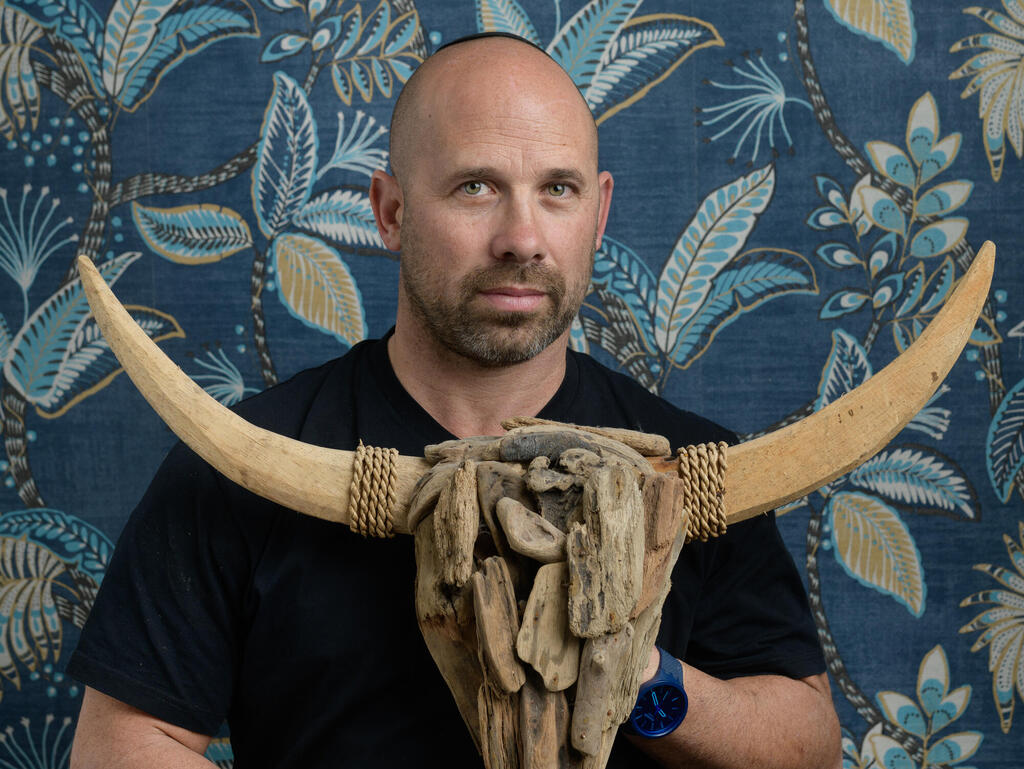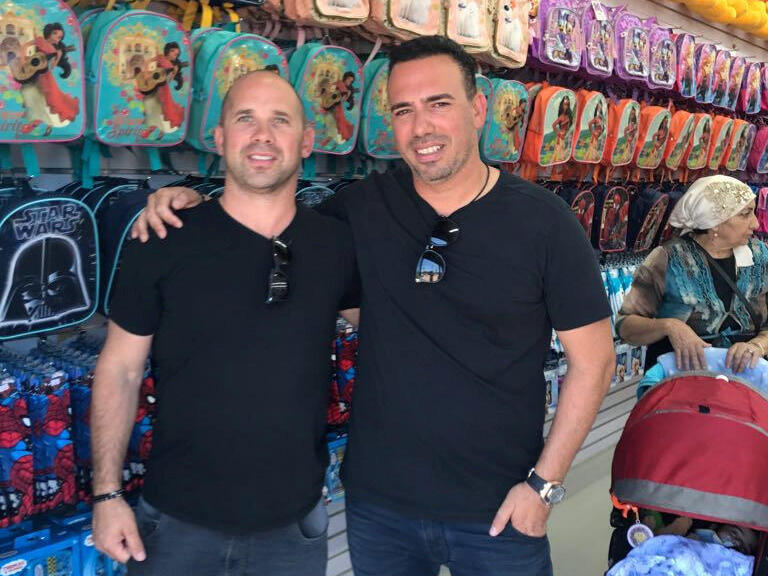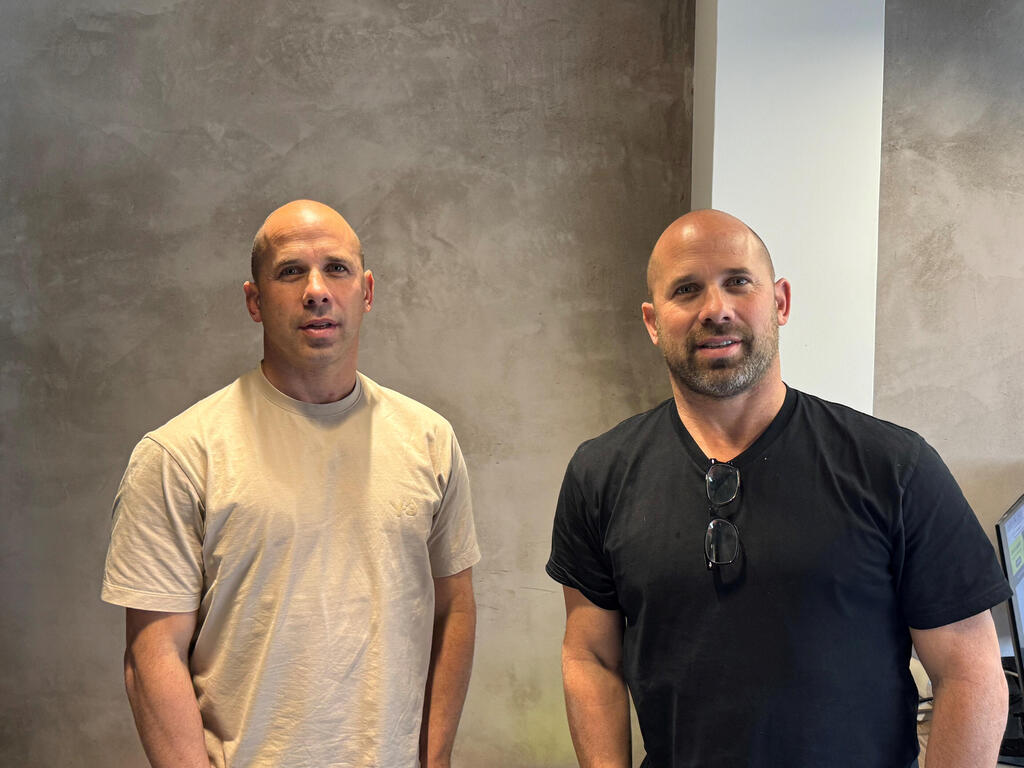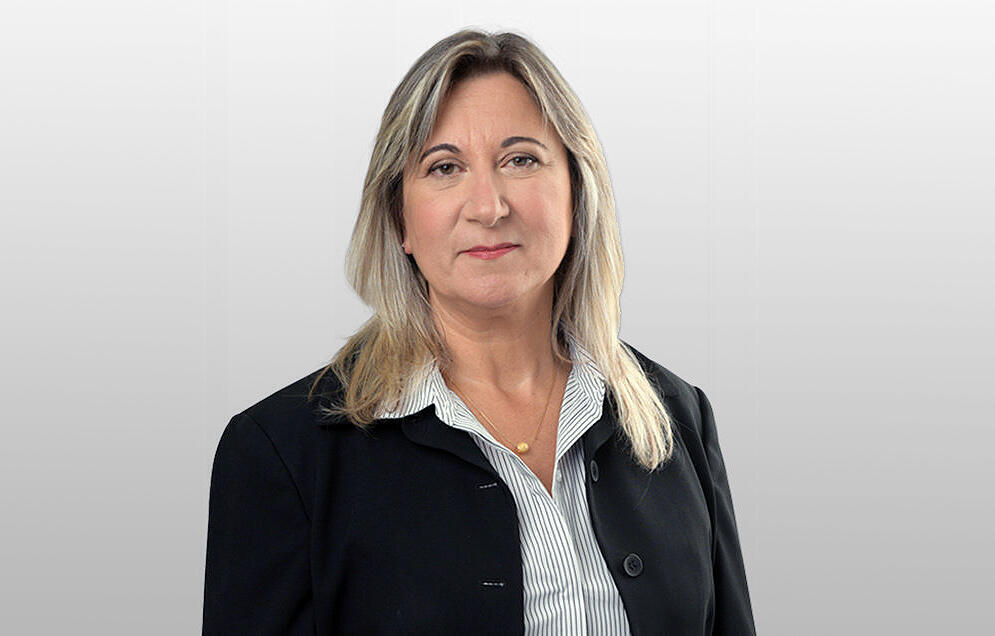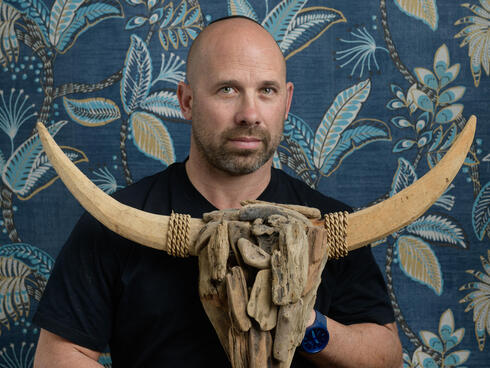
Hello, Neumann: Aussie serial investor takes Israel by storm
Evan Neumann left Max Stock, a nationwide chain of discount stores, with an impressive exit and rolled through investments in cultured milk and high-tech until he settled at the real estate company Aspen Group. In an exclusive interview, he explains why he's not afraid of high interest rates, what makes him feel at home in Israel, and why he loves frenzied investing, which looks like a shopping spree at a Max store.
The name Evan Neumann first appeared in the headlines of Israeli business newspapers 11 years ago. This occurred when the then-unknown Australian businessman invested NIS 60 million in the discount chain Max Stock for a third of its shares. Eight years later, Neumann (46) gradually sold his stake in the chain for about NIS 340 million, demonstrating his ability to recognize potential early. Since then, not only has Neumann’s business appetite grown, but his investment portfolio has also become almost as diverse as a Max Stock branch.
In the past four years, newspapers have reported on Evan Neumann’s entry into a wide range of industries. In December 2020, he invested NIS 4 million in the cultured milk company BioMilk. In May 2021, it was reported that he would acquire 10% of the shares of the high-tech company Galileo Tech, which is developing a platform for managing smart cities, for NIS 3.5 million. In September of the same year, he purchased 5.25% of the cyber company Hub Security for NIS 17 million. Two months later, he bought plots of land in Herzliya Pituach to build 24 private homes for NIS 200 million. Later, he added a third of the budget fashion chain Bgood to his investment portfolio. While these investments may initially seem anecdotal, it now appears that Neumann is reaching a significant milestone in his business career: entering the real estate sector.
In September 2023, a month before the outbreak of war, the public company Australia Israel — controlled by Neumann, his twin brother Ricky, and businessman Shlomo Akrish — signed an agreement to purchase 29% of the shares of Aspen Group, previously owned by Rony Zarom, for NIS 261 million. A few weeks ago, the deal was finalized, and the shares were transferred.
When asked how someone who spent most of his business career in retail is unafraid to make such a significant investment in a field unfamiliar to him, Neumann described it as a natural stage in his business evolution. "When you look at people in real estate worldwide, you find that they are often people who have done business in other fields, even clothing dealers. If you understand customers in one field, you can also understand them in another — like real estate. For example, consider the questions we asked ourselves at Max Stock: Where is the best place to open? Who are our customers? Where do they come from? How do you build a warehouse? The common factor in all these questions is understanding your customer — what they need, how they think. A good trader knows how to see a product and assess its potential value. Sometimes the price will be 2.5 shekels, and other times it will be a thousand shekels. And who buys real estate? The same customer you met at the discount store."
In Herzliya Pituach, you purchased a project to build private homes for 200 million shekels. Anyone who buys there isn’t a discount shopper.
"That’s true, but I understand them. At Max Stock, a customer riding a bicycle or driving a Ferrari could shop with us. But in real estate, there’s no low-cost option. Aspen isn’t a company for premium customers. It has two arms: one that focuses on commerce, offices, and logistics, and the other — 50% of the company Aspen purchased six months ago from Yossi Rayk — is its residential apartment division. This deal positions us to operate across the entire real estate spectrum."
Wouldn’t it be better to focus on one thing, like Max Stock founder Ori Max, and do it exceptionally well for your entire life?
"He’s right, but I have ADD — or, more precisely, A to Z. I know a little about everything, so I connect with good partners. I hate seeing an opportunity and not taking it. Passing up a good deal feels wrong, even if investing the same money in a stock could yield a similar return. I like to dive in, build something, and make it happen. It’s been like this since childhood — it’s a compulsion. People tell me, ‘Why are you running? Relax, you have a 4x4, you have everything.’ But I wake up every morning hungry — as if I have nothing."
Does it always work out?
"As I get older, I’m getting better at saying ‘no.’ Of course, I’ve had investments that didn’t work. If you’re not willing to fail, you’ll never succeed. I’ve put money into companies that failed, but I’ve never risked money that would affect my life. The losses were on funds I was willing to bet. Part of being successful in wholesale and retail is ensuring people are happy. When you’re a pleaser, it’s hard to say ‘no,’ but sometimes refusing is the best decision. In hindsight, I reflect on all the things that didn’t work — investments in businesses I couldn’t control. Nowadays, I try to focus on ventures where I have greater influence."
“We bought a Toyota for the price of a Ferrari? I see two Ferraris in the driveway.”
Neumann’s significant entry into real estate began in 2021. After selling Max Stock shares, Neumann, along with his brother Ricky and Shlomo Akrish, took over the listed real estate company that was later renamed Australia Israel. The group made a personal investment of over 70 million shekels and expanded its activity in income-generating real estate. This included acquiring control of Beit Herut-Lyish Development Company, which owns several properties, including the well-known M-Haderech shopping mall at the Beit Yanai interchange.
Two years later, Australia Israel acquired 29% of the 47% stake held by Rony Zarom in Aspen Group for NIS 237 million. The 29% acquisition — the maximum permissible without being considered control of the company under laws prohibiting a three-tier structure of public companies — made Australia Israel Aspen’s largest shareholder. However, the amount paid raised eyebrows, as it reflected a price double the market valuation. Currently, Aspen shares held by Australia Israel are valued at NIS 115 million, representing a paper loss of 50%.
Some investors claim the investment in Aspen doesn’t make sense — that you bought a Toyota for the price of a Ferrari.
"That’s because not everyone sees what’s in the parking lot. Those looking from the outside see a Toyota, but we see two Ferraris."
What do you see that others don’t?
"Let’s start with the fact that Pie Siam is undervalued. Its assets are among the best in Israel. Pie Siam’s value is NIS 1 billion, and Aspen’s share in it is worth NIS 500 million. The rest of Aspen’s assets remain solid. We own income-generating properties with reputable tenants. In Ashdod, for example, we co-own an automated warehouse set to be the largest in the Middle East — a billion-shekel project in high demand, yet it’s not factored into current valuations. Additionally, we purchased 50% of Yossi Rayk’s holdings in an urban renewal company, enabling us to enter the residential housing sector.
"The bottom line is that Aspen has a strong foundation. It’s only a matter of time before the market recognizes its true value. We’re not here for a quick flip; we’re here to build and improve. This is a project that will take at least 10 to 15 years."
The real estate sector is considered one of the most challenging in the current economic climate. Interest rates are sky-high, there’s a labor shortage in construction, and any delays in delivery can be financially devastating.
"What’s bleeding is entrepreneurship. We don’t do much development at Aspen. Most of our properties are income-generating, with rental agreements linked to the index. So, as long as you have tenants, you’re receiving rent. On top of that, 50% of our business is in the Netherlands, where there are no war-related issues, and interest rates are starting to decline. I’m optimistic. Real estate is a long-term business — a 20-year game of patience, strategy, and vision."
So, the key is to endure the tough years?
"‘Endure’ is the wrong word. It’s not like we operate only in the office sector, which is facing significant challenges. We’re diversified across logistics, retail, shops, hotels, and soon housing. The current situation impacts Pie Siam more because they develop hotels. However, most of their hotels are already built, and projects under construction are backed by bank guarantees, so the risk is manageable. The issues mainly involve their remaining debts and the unbuilt projects."
How did you meet Shlomo Akrish, your partner alongside your brother?
"When I was at Max Stock, we rented a store from him. I noticed that he had a deep understanding of real estate, and when he suggested working together, I knew I wanted to partner with someone like him. The first deal we did together was buying commercial space in Ashkelon, half of which we recently sold to Yuka, a company specializing in small warehouses. Shlomo is also my partner in the private housing project in Herzliya."
In March 2024, you acquired 50% of Yossi Rayk’s urban renewal company for NIS 45 million. Why did you want Aspen to venture into housing?
"In addition to Israel’s natural population growth — the highest among OECD countries, which isn’t being adequately addressed — there’s another factor: about one-third of the three million married people in Israel eventually get divorced, and they need homes. In Europe, people often rent for life, and that’s perfectly fine — sometimes even a better deal. But in Israel, there’s a strong cultural drive to own a home. It’s something deeply rooted in the Jewish psyche."
"I worked with Ori Max every day. He was my 'absorption office'."
The last time I met Neumann was in 2017, just before the deal where Apax Partners, managed by Zehavit Cohen, acquired 55% of Max Stock shares, valuing the company at NIS 300 million. Neumann and Max were excited, their energy infectious to branch managers and suppliers alike. Since then, they haven’t given interviews. Back then, Neumann barely spoke Hebrew.
"I’ve been in the discount business my whole life," he shared at the time. "I started in my father’s market stall in Sydney, which eventually grew into a chain of stores like Max Stock. After my father sold that business, my twin brother and I started a surplus sales company. Once we sold that, I decided to immigrate to Israel. My brother encouraged me, saying, ‘Go for it; this can be the first step for the whole family.’ So I did. My original plan was to establish a discount store chain like Max Stock in Israel, but when I discovered such a chain already existed, I initially thought, ‘Damn it.’ But then I realized, ‘I’m a new immigrant with limited Hebrew skills. If I can’t beat them, I’d better join them.’ It turned out to be a great decision."
In 2014, shortly after moving to Israel, Neumann bought a third of Max Stock for NIS 60 million, valuing the chain at NIS 180 million. By 2017, the company’s value had grown to NIS 300 million. In September 2020, when the company went public on the Tel Aviv Stock Exchange, it was valued at NIS 1.7 billion — a staggering success.
Neumann is generous with praise when asked about the intuition that led him to choose Ori Max as his business partner for the venture.
"From our first meeting, I knew we could succeed together. Ori was positive, smiling, smart, generous, and full of energy. We shared the same mindset — a ‘discount DNA.’ In the end, it all comes down to understanding your customer. You need to know how to sell to them and keep them satisfied. That’s why service is so important to us. It’s the DNA of hospitality: putting yourself in the customer’s shoes. For us, it’s about much more than just buying from a cheap supplier."
Explain.
"All retailers can purchase almost anything at the same prices. For instance, there were items we bought from Walmart suppliers. To succeed, you have to create a culture in your business where employees genuinely care. At Max Stock, we implemented a co-manager model. With this approach, an employee who sees a product that’s fallen on the floor will instinctively pick it up and return it to the shelf. Customers notice these small details.
"Additionally, we created a unique shopping experience at Max Stock. Before us, cheap products were sold in poorly lit 'everything for a dollar' style stores with shabby carpeting. Our concept was different: we wanted Max Stock to feel like a pharmacy — well-lit, clean floors, and an overall pleasant atmosphere. Choosing which supplier to buy from, at what price, and determining the variety needed — that's an innate skill. The foundation is knowing how to assess a product and predict how much you can sell it for."
What was your working relationship like with Ori Max, and how did you divide responsibilities during your time at Max Stock?
"Ori and I worked together every day, hour by hour, for seven years. We were completely aligned and did everything together. But since Israel was new to me, and I was a recent immigrant who didn’t even speak Hebrew, Ori was like my 'absorption office.' From his side, I think my involvement gave him confidence. Working alone is less enjoyable, and we did everything as a team — traveling to suppliers, attending exhibitions, opening stores, even sharing hotel rooms on business trips.
"When Max Stock became an international company, I naturally became the 'foreign minister.' Our energy was infectious. Suppliers wanted to work with us because they could feel it. We didn’t need a 'bad cop.' When a business is this healthy, you don’t need that dynamic."
He seemed confident, and you invested NIS 60 million for a third of the business.
"Yes, I invested money, which might have reassured him that people from abroad believed in and trusted his business. But to be honest, he could have succeeded without me; I couldn’t have done it without him."
You likely brought skills he lacked, like leading the pre-IPO roadshow in English.
"Yes, I played a significant role in the IPO. Around 80% of the funds invested in Max Stock came from American investors. But there has to be a solid business to showcase — not just a pretty presentation. The roadshow was a huge success, and I definitely contributed to that."
If things were so successful, why did you sell your stake in Max Stock?
"I like to juggle multiple projects simultaneously, and it wouldn’t have been fair to Max Stock if I stayed while being so busy with other ventures. But I still talk to Ori often. Our relationship was never just about business. He still owns 15%-16% of Max Stock, and Apax is still there with Zehavit Cohen, which is great. As I say, 'If you’re making money for her, you’re doing fine.'"
How did the Apax deal come about?
"A broker, who knew we were looking for private equity, suggested we meet Zehavit. Back in 2012, people were saying retail was dead, but we believed otherwise. It turned out retail was alive and thriving. Working with Zehavit was a positive experience. She’s tough, knows how to say 'no,' and that’s why she’s so successful. Unfortunately, when women are assertive, they’re sometimes unfairly judged."
Were there any challenging moments with her?
"No, because the business was always performing well. Ultimately, it’s not her money — it’s the fund investors’ money, and she’s understandably cautious about bad news. But with us, the business was always in great shape."
"I felt ashamed I didn’t grow up in Israel"
Neumann was born in Johannesburg, South Africa, and grew up there until his family emigrated to Australia in 1984, when he and his twin brother Ricky were six years old. He describes his upbringing in cultural terms:
"South Africans are like the Moroccans of the Ashkenazim," he says hesitantly. "They’re traditional — they attend Jewish schools, observe Shabbat, but not too strictly. In our family, we’d drive to synagogue on Shabbat."
The twins began their business collaboration at 15, working in their father’s business.
"It was the best school in the world — you learn everything: math, psychology, and geography by dealing with people from all over the world," says Neumann. "We’ve been in business together since we were 20, running a wholesale surplus business. To this day, suppliers who know me but not Ricky sometimes confuse us and get offended when he doesn’t recognize them. By the way, we both have six children."
After selling their wholesale business, Neumann decided to immigrate to Israel.
"I always wanted my children to grow up here," he says. "When I came to Israel 11 years ago, only one of my sisters lived here. Since the pandemic, my entire family has followed — siblings, parents, everyone. Most of us live in Ra’anana, and we’re happy here. The weather is great, the food is kosher — what more do you need? My twin brother is still my business partner. He manages our operations in Australia while I’m hands-on in Israel."
Were you raised with the idea of making aliyah?
"My father spent his teenage years in Israel at the Aloney Yitzchak Youth Village and even volunteered during the Yom Kippur War. But he wasn’t keen on living here. Yet, every morning in Australia, he’d read the Jerusalem Post. I once asked him, 'You care so much about Israel, why don’t you live there?' He replied, 'That doesn’t mean you have to live there.' Still, I believe aliyah is something ingrained in every Jew.
"I moved here at 34, ten years after marrying my Israeli wife, who I met during a visit. Like me, she’s religiously liberal and works as a doula. I’ve always loved Israel’s vibe, its brashness, and its attitude. Growing up in Australia, I felt ashamed I hadn’t grown up in Israel. I didn’t want my children to feel the same way."









